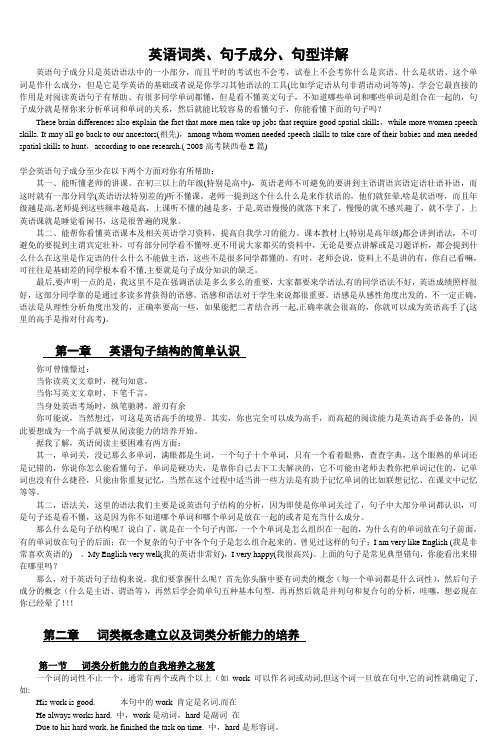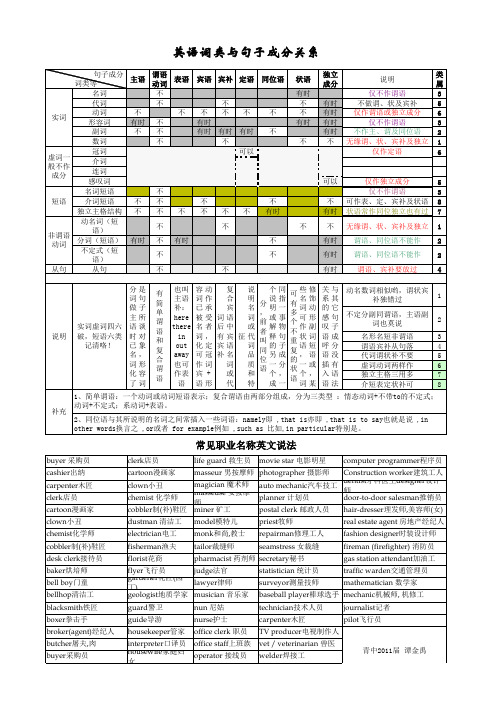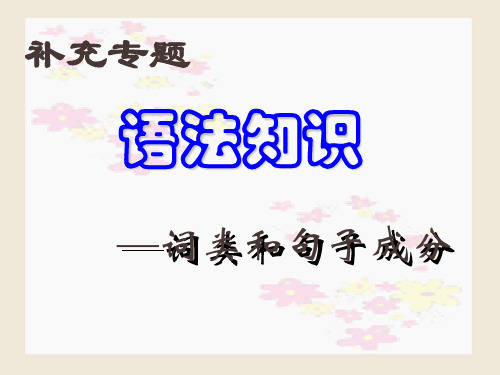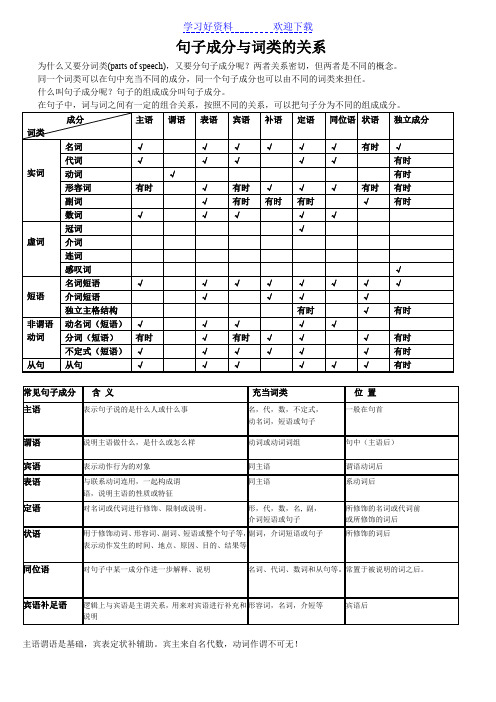词类和句子成分75979
- 格式:doc
- 大小:193.51 KB
- 文档页数:35

英语词类、句子成分、句型详解英语句子成分只是英语语法中的一小部分,而且平时的考试也不会考,试卷上不会考你什么是宾语、什么是状语、这个单词是作什么成分,但是它是学英语的基础或者说是你学习其他语法的工具(比如学定语从句非谓语动词等等)、学会它最直接的作用是对阅读英语句子有帮助、有很多同学单词都懂,但是看不懂英文句子,不知道哪些单词和哪些单词是组合在一起的,句子成分就是帮你来分析单词和单词的关系,然后就能比较容易的看懂句子,你能看懂下面的句子吗?These brain differences also explain the fact that more men take up jobs that require good spatial skills,while more women speech skills. It may all go back to our ancestors(祖先),among whom women needed speech skills to take care of their babies and men needed spatial skills to hunt,according to one research.( 2008高考陕西卷E篇)学会英语句子成分至少在以下两个方面对你有所帮助:其一、能听懂老师的讲课。
在初三以上的年级(特别是高中),英语老师不可避免的要讲到主语谓语宾语定语壮语补语,而这时就有一部分同学(英语语法特别差的)听不懂课,老师一提到这个什么什么是来作状语的,他们就狂晕,啥是状语呀,而且年级越是高,老师提到这些频率越是高,上课听不懂的越是多,于是,英语慢慢的就落下来了,慢慢的就不感兴趣了,就不学了,上英语课就是睡觉看闲书,这是很普遍的现象。
其二、能帮你看懂英语课本及相关英语学习资料,提高自我学习的能力。
课本教材上(特别是高年级)都会讲到语法,不可避免的要提到主谓宾定壮补,可有部分同学看不懂呀.更不用说大家都买的资料中,无论是要点讲解或是习题详析,都会提到什么什么在这里是作定语的什么什么不能做主语,这些不是很多同学都懂的。





现代汉语的词性及句子成分实词是有实在意义的词,可以独立充当句子成分,一般可以单独回答问题。
每一个实词都可以详细解说其词义。
一般有名词、动词、形容词、数词、量词、代词六类。
(古汉语中代词属于虚词)(一)名词:是表示人、事物或抽象概念名称的词。
如:书本、桌子、儿童、雷锋、思维、政治等。
(二)动词:是表示人或事物的动作、存现及发展趋势的词。
如:走、跑、思考、学习、有、存在、能、可以等。
(三)形容词:表示人或事物的性质、状态的词,汉语中的形容词可以修饰名词,也可以修饰动词,与英语不同。
如:老、好、漂亮、干净、纯洁、飞快。
(注:与英语不同,汉语中形容词同样也可以修饰动词形容词)(四)数词:表示数目的词。
如:一、十、第八、每等。
(五)量词:表示人或事物及动作的计量单位的词。
量词一般与数词连用构成数量短语。
如:个、件、幢、下、次、趟等。
(六)代词:用来指代人、事物、状态、过程的词。
如:你、他们、这、彼等。
虚词是没有实在意义的词,一般不能单独充当句子成分(副词例外),不能单独回答问题(少数副词除外)。
其存在的价值在于帮助构成句子的语法结构,表示某种语法关系。
汉语的虚词主要有六种:副词、助词、连词、介词、叹词、拟声词。
(一)副词:在句中表示动作行为的性质、状态的程度、范围、时间、趋向等的词。
如:很、非常、一律、也、将来等。
“不、没有、也许、大概”(二)助词:在句中起辅助作用的词。
现代汉语中的助词主要有:“的”、“地”、“得”、“着”、“了”、“过”。
文言文中助词比较复杂,常见的有“之”、“者”等。
(三)连词:在句中起连接作用的词,连词往往标示词、短语、句子、句群、语段之间的逻辑关系。
如:虽然、但是、因此、无论等。
连词常常成对搭配使用或与副词搭配使用,如:“因为……所以……”、“即使……也……”、“只有……才……”等。
(五)叹词:表示感叹或惊奇、惊喜、疑虑等语气的词。
如:啊、唉、呀等。
(六)拟声词:模拟人或事物声音的词。
词类、句子成分和简单句的五个基本句型(一)词类:英语词类分十种:名词、形容词、代词、数词、冠词、动词、副词、介词、连词、感叹词。
1、名词(n.):表示人、事物、地点或抽象概念的名称。
如:boy, morning, bag, ball, class, orange.2、代词(pron.):主要用来代替名词。
如:who, she, you, it .3、形容词(adj..):表示人或事物的性质或特征。
如:good, right, white, orange .4、数词(num.):表示数目或事物的顺序。
如:one, two, three, first, second, third, fourth.5、动词(v.):表示动作或状态。
如:am, is,are,have,see .6、副词(adv.):修饰动词、形容词或其他副词,说明时间、地点、程度等。
如:now, very, here, often, quietly, slowly.7、冠词(art..):用在名词前,帮助说明名词。
如:a, an, the.8、介词(prep.):表示它后面的名词或代词与其他句子成分的关系。
如in, on, from, above, behind.9、连词(conj.):用来连接词、短语或句子。
如and, but, before .10、感叹词(interj..)表示喜、怒、哀、乐等感情。
如:oh, well, hi, hello.(二)句子成分:英语句子成分分为七种:主语、谓语、宾语、定语、状语、表语、宾语补足语。
1、主语是句子所要说的人或事物,回答是“谁”或者“什么”。
通常用名词或代词担任。
如:I’m Miss Green.(我是格林小姐)2、谓语动词说明主语的动作或状态,回答“做(什么)”。
主要由动词担任。
如:Jack cleans the room every day. (杰克每天打扫房间)3、表语在系动词之后,说明主语的身份或特征,回答是“什么”或者“怎么样”。
现代汉语词性现代汉语的词可以分为12类。
实词:名词、动词、形容词、数词、量词和代词。
(实词,是汉语词类中的一种,词语中含有实际意义的词,实词能单独充当句子成分,即有词汇意义和语法意义的词。
把语法功能作为主要依据,认为能够单独充当句法成分,有词汇意义和语法意义的是实词。
)虚词:副词、介词、连词、助词、叹词、拟声词。
(虚词泛指没有完整意义的词汇,但有语法意义或功能的词。
具有必须依附于实词或语句,表示语法意义、不能单独成句,不能单独作语法成分、不能重叠的特点。
)一、名词表示人和事物的名称的实词。
如:"黄瓜、白菜、拖拉机、计算机"。
包括:1.表示专用名称的叫做"专有名词",如"云南、上海、李白、白居易"。
2.表示抽象事物的名称的叫做"抽象名词",如"范畴、思想、质量、品德、友谊、方法"。
3.表示方位的叫做"方位名词",如"上""下""左""右""前""后""中""东""西""南""北""前面""后边""东边""南面""中间"等。
二、动词动词表示人或事物的动作、行为、发展、变化。
1.动词来表示一般的动作:如"来、去、说、走、跑、学习、起飞、审查、认识"等。
2.动词来表示心理活动:如"想、重视、注重、尊敬、了解、相信、佩服、惦念"等,这样的动词前面往往可以加上"很、十分"等程度副词。
3.动词表示能够、愿意这些意思叫做"能愿动词",它们是"能、要、应、肯、敢、得(dei)、能够、应该、应当、愿意、可以、可能、必须",这些能愿动词常常用在一般的动词前面,如"得去、能够做、可以考虑、愿意学习、应该说明、可能发展"。
词类和句子成分P19I. n.1. 普通名词专有名词2. 名词单数复数3. 名词的所有格II. art. Unit 13 P380 III. pron.不定代词:some, any, no, all, one, every, much, many, little, a little, few, a few, either, both, something, somebody….IV. num.1. 基数词2. 序数词V. adj.VI. adv. Unit 11 P294VII. v.1. 时态Unit 6 P1592. 语态Unit 7 P1913. 非谓语动词Unit 8-10 P219,P251, P2834. 语气Unit 18 539VIII. prep. Unit 12 P348IX. conj. 引导从句1. 名词性从句Unit 15 P4472. 定语从句Unit 16 P4753. 状语从句Unit 17 P507 X. inter.Grammar ExercisesI. Name the parts of speech of the following words.whether连词towards介词second数词hour名词repeat动词successful形容词not副词probably副词than连词because连词which连词/代词even副词intelligent形容词differ动词regular形容词some形容词/代词/副词into介词oh感叹词seem 动词communicate动词II. Name the parts of speech of the underlined words in the following sentences.1. Let’s sit round the table.2. The milk remained fresh for a week.3. I will ask leave to call on you on Monday if you can spare me the time.4. Even a child can do it.5. Where there is a will, there is a way.6. After a storm comes a calm.7. The prices of your products seem higher than those of other makes.8. He is given so much without having to do anything in return.9. He’s very strict and makes us work very hard.10. The television news will have a live report of the important meeting in Paris.1.let动词round介词2.fresh形容词for介词3.leave名词call动词on介词if连词spare动词4.Even副词it代词5.Where连词will名词6.after介词calm名词7.seem动词those代词makes名词8.without介词return名词9.strict形容词work动词10.news名词live形容词meeting名词III. Underline the subjects and the predicate verbs of the following sentences.1.Most adults would disagree with this statement.2.How much time did they allow you for doing the work?3.I had a visit from Mary yesterday.4.China's stand on this question is clear to all.5.Warm clothes protect against the cold of winter.6.What we need is more practice.7.There doesn't seem to be much chance of my getting the job.8.In those years the cost of living rose by nearly 4 percent.9.There are a number of people interested in the case.10.Every means has been tried but without much result.IV. Name each of the underlined members of the following sentences.1. I read a magazine after dinner last night.2. A friend in need is a friend in deed.3. Telephoning a place outside your area is called telephoning long distance.4. you can leave your children to the day-care center all day.5. Under his direction she set herself to learn French6. He doctor advised me to get plenty of exercise.7. How long does it take for a letter to get to London?8. God helps those who help themselves.9. They considered her above others.10. Your plan to build a hotel in the village considers first the interest of the foreigners.1.a magazine 宾语last night 时间状语2.in need定语in deed 方式状语3.outside your area定语telephoning long distance宾语4.your children宾语all day 时间状语5.his direction 介词宾语French 宾语6.me 间接宾语plenty of exercises 不定式的宾语7.long 宾语to London 地点状语8.those 宾语help themselves定语从句的谓语9.her宾语above others 宾语补足语10.to build a hotel in the village 定语of the foreigners 定语五大基本句型Basic Sentence Pattern P53S V PS VS V OS V Oi OdS V O CI. S V PV系:e.g.: I am Leos.The train is to leave at 3 p.m.My job is selling newspaper.It is amazingMy duty is off.II. S VVi. 不及物动词,后不加谓语e.g.: The sun rises in the east.The book belong in the textbook.III. S V OVt. 及物动词+宾语e.g.: The machine is drilling a hole.I will take it.I want to be someone.Stop crying!I will count three.IV. S V Oi OdVt. 及物动词+双宾语e.g.: I told you a storyHis parents bought him an expensive apartment near the Summer Palace.I told a story to youHis parents bought an apartment for himV. S V O CVt. 及物动词加宾语,以及宾语的补足语。
宾语与补语之间是逻辑上的主谓关系e.g.: I allow my students to copy their assignments.My students copy their assignmentsThey call me Leos.I am Leos.Grammar ExercisesI. Write the Basic Sentence Pattern after each of the following sentences.1. The sun sets in the west.2. She has been looking for her lost watch.3. They have elected him president.4. A bird in the hand is worth two in the bush.5. Bad workmen often blame their tools.6. They smelled the material burning.7. President Clinton clearly suspects his party to have little chance of winning the next election.8. She seldom showed her feelings.9. Could you tell me the right time, please?10. I always find her happy.11. You must get everything ready before six.12. Now housing problems are becoming more and more serious.13. He advised the young man to give up smoking.14. She bought her daughter a foreign-brand ice-cream.15. His dream of becoming an engineer has come true.S V; S V; S V O C; S V P; S VOS V O C; S V O C; S V O; S V O O; S V O C;S V O C; S V P; S V O C; S V O O; S V PII. Fill in the blanks with the appropriate verbs given below. remember look gave was prefersounds need make worked insisted1. They ____ walking to cycling.2. He ____ on being treated as an ordinary worker.3. Computers ____ electricity for power.4. New technology would ____ an office or company better organized.5. I don’t ____ having ever promised you that.6. The flowers ____ especially pleasant after the rain.7. He ____ late to make up for his absence yesterday.8. She ____ not well prepared for all the new machines in the office.9. When you listen carefully, his story ____ true.10. He ____ her everything he had.prefer; insisted; need; make; rememberlook; worked; was; sounds; gaveIII. Choose the one that best completes the sentence.1. After a short time the computers ____ from Hong Kong.A. madeB. arrivedC. becomeD. paid2. He didn’t tell his friend that he was ____ worse and worse.A. leavingB. servingC. feelingD. receiving3. The president ____ Mr. Baker medical advisor.A. praisedB. promisedC. imaginedD. appointed4. Quality ____ more than quantity.A. mattersB. furthersC. overcomesD. enjoys.5. The dish doesn’t ____ so good as it looks.A. eatB. tasteC. feedD. drink6. That will ____ us a lot of trouble.A. dropB. cutC. saveD. spare7. He ____ his seat to a woman with a baby in her arms.A. offeredB. orderedC. satD. left8. I don’t ____ what you do, but please do something.A. mindB. refuseC. objectD. care9. Have you ever ____ going to Canada?A. consideredB. thoughtC. wantedD. supposed10. If you ____ by bus often, you may want to buy a bus pass.A. goB. sitC. sunD. rideB C D A BC AD A DIV. Translate the following sentences into English, using the sentence patterns given.句子的用途分类P107I. 陈述句II. 疑问句1. 一般疑问句一般疑问句是疑问句的一种。